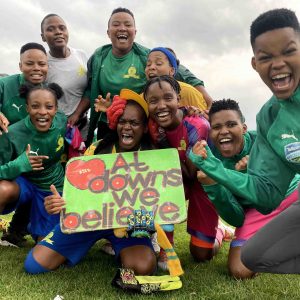How football helped Thinasonke Mbuli grieve
The Banyana Banyana assistant coach defied her mother’s wishes when she pursued a career in sport. But football has kept Mbuli sane through tragedy, and it’s a choice she would make again.
Author:
25 September 2020

Life as she knows it today would have been vastly different for Thinasonke Mbuli had she obeyed her mother’s wishes. Happy Mkhwanazi-Mbuli had dreams of her only daughter becoming a chartered accountant, say, at the University of the Witwatersrand. It seemed an acceptably stable life path for a young black woman making her way through the early 2000s, when South Africa was filled with hope and a world of opportunity was beckoning.
But the strong-minded Mbuli had other ideas. She had loved sport – football in particular – since the days of kicking a ball around in the streets of Mkhondo, Mpumalanga, with her brother and cousins. She loved the game even when playing it out of sheer boredom at high school in Richards Bay, KwaZulu-Natal.
“My mother didn’t talk to me for three months when I told her I’m going to DUT [Durban University of Technology] to study sports management. At the time I didn’t know why I wanted to do sports management. I wanted to do anything that is sports-related,” Mbuli recalls.
The 38-year-old’s rise through the rickety ranks of women’s football in South Africa to become Banyana Banyana assistant coach and coach of the women’s team at the University of the Western Cape (UWC) may not have been what her late mother wanted, but it would have filled her with deep pride nonetheless.
Memories are a source of comfort for Mbuli. She’s the only surviving member of her nuclear family of four and memories are all she has been able to cling to as, one by one, they have died. She’s found tragedy inescapable in her young life, but from sorrow she finds inspiration and motivation. She now lives and works to make her dearly departed proud.
Related article:
“I lost my brother while I was on my way to a tournament. I received a call saying, ‘Don’t go to Pietermaritzburg now, you must go home.’ When I arrived home, I saw that he was no more. The only thing that has kept me sane is football. Otherwise, there’s nothing,” says Mbuli.
“I’m alone now. The only thing that has kept me going is football. It’s not easy to lose a parent. If you lose a father, you say at least I have my mom. If you lose your mom, you say at least I have my brother. Now I don’t have anyone. I might have other [extended] family members but it’s not the same.”
Boredom gives rise to interest
Mbuli was born and raised in what was then Piet Retief. At the age of 13, she moved to the north coast of KwaZulu-Natal to complete high school. It was at boarding school at Dlangezwa High School in Richards Bay that a young Mbuli’s potential in football was noticed. “I loved football in high school. It was a boarding school, so all we could do was play. There was nothing else to do,” she says.
There are few who understand women’s football in South Africa like the midfielder does, having played football at school and university in KwaZulu-Natal, and then rising through the ranks at club level and ultimately becoming a coach and mentor to a generation of women footballers.
“I went to tertiary and started to get opportunities to play and represent the tertiary side. I was lucky enough to play in the Ussa [University Sports South Africa] national team. Then I played for clubs like Durban Ladies and Sunflower. The coaching part started in my last year in varsity. I was one of the senior players in the team. Our coach at the time got an offer to coach Golden Arrows. He couldn’t coach both sides, so he said to me, ‘Thina, just be here. Just be a player-coach and we’ll try to get a permanent coach.’ I later realised I enjoyed it and I started going for my coaching licence,” says Mbuli.
Mbuli was appointed UWC coach in February 2019. Her intimate knowledge of the women’s game has allowed her to highlight the flaws in the system, something she feels needs to be addressed to raise the standard of the South African Football Association National Women’s League, which started last year.
Frustrations in the top league
“In terms of organisation, it was frustrating. At times we go to games and then we wait for referees. Both teams are there but the referees are not there. At times you’re playing and you realise the referee doesn’t even understand the laws of the game. When the opposition pushes her, she does something else. When it’s a TV game, you get top referees,” says Mbuli. “We all need to improve organisation-wise, from us as coaches to administrators. If we coach well during the week, it means come the weekend the players will improve. It’s a chain. We all must do something.”
Related article:
Adjusting to a new life in Cape Town has not been easy for Mbuli. “I lived in KZN for 23 years, so it was my first time moving out of the province. I had to adjust in terms of the environment. The weather is terrible. Luckily enough in terms of the league, we knew that in the first season there’s no relegation, so we used the first season to build a team culture and to come up with a team philosophy that will help us going forward next season. We threw a lot of games away. It was tough, we finished sixth. We could have done better but we started badly.
“The teams that will make it are the universities because the universities have the facilities. They have other programmes besides playing in the league, so sometimes we play the national club champs, we play varsity football. The structure is there, unlike a club which is just a club. You must look for a training facility, you have to book transport to move around.
“It’s easy for universities. It might not be where we want it to be, but we are far better off than the other teams. Maybe teams like [Mamelodi] Sundowns won’t struggle, but for the other clubs it’s tough. For most of them, the coach is the manager, driver, physio, he’s everything. We are lucky because the university can employ as many coaches as they want. They have the budget.”
Mbuli knows too well the obstacles and blatant discrimination women’s football faces in South Africa, where little to no financial or moral support exists from the government or private sector. It’s an injustice that stokes a fire deep in Mbuli’s belly, and one that she hopes to bring to the fore in her current position at UWC and as assistant to Banyana Banyana coach Desiree Ellis. The global Covid-19 pandemic has decimated the sports industry in South Africa, which bodes ill for the gains made in women’s sport. Sponsors are having to rethink their priorities as global economies shrink.
“I hope women’s football won’t take a back seat again,” says Mbuli. “It took a lot of hard work, it took a lot of time to be where we are, to have more people recognising women’s football in South Africa. With Covid-19 it will be very tough even for companies to say, ‘Let’s do something for women’s football.’ It’s going to be tough for everyone, but I hope and pray that even if companies don’t come on board that even Fifa can fund the federations so that they can assist women’s football.”
Building on recent successes
The past few years have been golden for women’s football and culminated in Banyana Banyana qualifying for the Fifa World Cup in France last year. But to get that far took many years of toil and frustration that could have been avoided had the playing field been levelled years ago.
“If you look at what women’s football has achieved over the past three years – the Under-17s went to the World Cup, Banyana Banyana went to the World Cup. If we can have a team going to a World Cup, it means our league must be doing something right. But players will only improve by playing games.
“If the sponsors don’t come on board, even the public won’t take notice of us. Even this year there are more people talking about women’s football because the SABC was televising the games. Sasol has done so much for women’s football, but it can’t be only Sasol. It’s disappointing, but I hope it will get better. Our ladies have done so much, so surely those players deserve to play in a better league.”
Related article:
Coaching next to Ellis has been a true pleasure and privilege for Mbuli, who looked up to her mentor even when Ellis downplayed her own status. Ellis has been a leading light in women’s football and has led the way for players and coaches like Mbuli.
“Before you are a coach, you’re a human being. Those who know Desiree will tell you that she’s a good person. She has a good heart, so it’s very easy to work with someone like that because everything she does comes from a good heart. If you work with her, you won’t even know that she has been African Coach of the Year two times,” says Mbuli.
“We did our last coaching qualifications together. She’s still the same person that she was in class, [it’s] just that now she is the national team coach. I learned a lot from her because she worked with coach Vera [Pauw], who is one of the best coaches in the world. We share a lot. She’s my friend now, no longer just a colleague.”
Mbuli’s journey at the heart of women’s football in South Africa has been a fulfilling one, and to her it feels like she’s just begun. The road ahead appears littered with more obstacles and Covid-19 has left sports communities and hopeful young players searching for solutions. But the journey is a part of life, Mbuli says, and one she would choose time and time again, even against her mother’s wishes.
“It’s been amazing. I’ve learned a lot. I see football in a different way now. As a national team coach, you make sacrifices. You sacrifice your social life. Sometimes you can’t go to family gatherings at home because you are away on national duty. And it forces you to study, to learn more because you want to improve the players. It’s been an amazing journey, but it’s tough, I won’t lie.”



